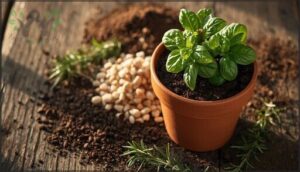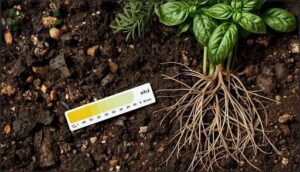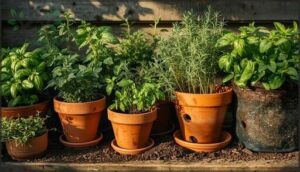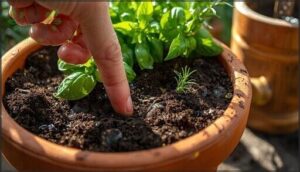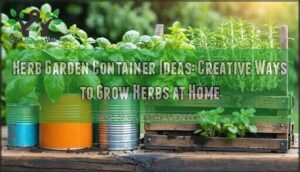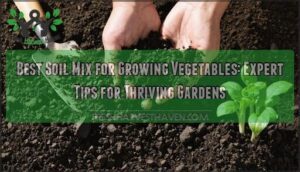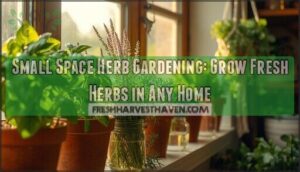This site is supported by our readers. We may earn a commission, at no cost to you, if you purchase through links.
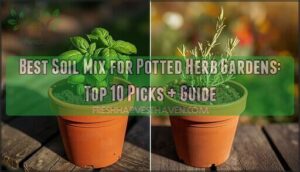
Table Of Contents
- Key Takeaways
- Choosing Best Soil Mix
- Top 10 Herb Soil Mixes
- 1. Dr Earth Organic Potting Soil Mix
- 2. Organic Coco Coir Grow Medium
- 3. Organic Potting Soil Mix Blend
- 4. Organic Potting Soil for Gardens
- 5. Organic Premium Potting Soil Blend
- 6. Indoor Herb Garden Soil Mix 4qt
- 7. Organic Black Potting Soil Mix
- 8. Organic Worm Castings Garden Fertilizer
- 9. Seed Starting Potting Mix Formula
- 10. Ocean Forest Potting Soil Mix
- Potting Soil Basics
- Soil PH and Nutrients
- Container Selection
- Watering And
- Frequently Asked Questions (FAQs)
- What is a good potting soil for herbs?
- What is the best potting mix for plants?
- How do I choose the right potting mix for my herb garden?
- What is the best potting soil for Mediterranean herbs?
- What type of potting soil should I use?
- Do you need potting soil for herbs & vegetables?
- What is the best soil mixture for potted herbs?
- What is the best soil mix for basil in pots?
- Which herbs should not be planted together?
- Can I use all-purpose potting mix for herbs?
- Conclusion
Key Takeaways
- The best soil mix for potted herbs combines quality potting soil, perlite, and compost for both drainage and nutrient balance.
- Mediterranean herbs like rosemary need gritty, fast-draining soil, while basil thrives with good moisture retention.
- Maintain a soil pH between 6.0 and 7.0 to help herbs absorb nutrients and avoid stunted growth.
- Always use lightweight, well-draining potting mixes—never dense garden soil—to prevent root suffocation and disease.
Choosing Best Soil Mix
Picking the right soil mix isn’t guesswork—it’s about matching your herbs’ needs to the environment you can provide. You’ll want to think about where your containers will live, what’s already in the mix, and whether the pH suits your plants.
Let’s break down the three key factors that’ll set your herb garden up for success.
Location Considerations
Your herb’s location isn’t just about aesthetics—it’s about matching soil drainage and moisture needs to the light, temperature, and airflow your plants will actually face. Indoor herb garden setups need soil that retains moisture longer since air circulation is limited and evaporation slows down. Your outdoor herb garden demands faster drainage because sun exposure and wind dry containers quickly.
Climate zones determine everything. Mediterranean herbs like rosemary thrive in hot, dry conditions with gritty, fast-draining mixes. Basil prefers morning sun with protection from scorching afternoon heat—you’ll need soil that holds moisture without getting soggy.
Soil temperature matters more than most gardeners realize:
- Cold outdoor placement in northern regions requires insulating container materials and soil with better heat retention
- Hot southern climates need lighter soil mixes with extra perlite for airflow and cooling
- Regional plants adapted to your area perform best when soil pH matches local conditions
Container gardening gives you control, but only if your soil composition matches where those pots actually live.
Fertilizer and Ingredients
The right fertilizer and ingredients transform mediocre soil into a thriving ecosystem for your herbs. Start with organic potting soil that includes compost as a base—it delivers measurable phosphorus, potassium, and micronutrients without synthetic additives. Most quality mixes blend peat moss or pine bark with perlite or vermiculite for moisture retention and aeration.
Nutrient balance centers on the N-P-K ratio printed on every fertilizer label. Phosphorus should equal or exceed nitrogen since it drives flowering and leaf production in herbs. Here’s what actually works:
- Balanced formulas like 10-10-10 provide equal parts nitrogen, phosphorus, and potassium by weight
- Organic fertilizers such as bone meal, feather meal, and worm castings improve soil structure while feeding plants
- Compost tea and fish emulsion boost nutrient uptake through beneficial microbes
- Slow-release options sustain nutrient density for months without reapplication
- Soil amendments like seaweed fertilizer add trace micronutrients including iron, manganese, and zinc
Understanding herb fertilization needs is essential for creating a balanced and thriving herb garden.
Mix fertilizer into the top four to six inches before planting for even distribution and maximum root contact.
PH Level Importance
Just like picking the perfect fertilizer sets your herbs up for success, landing in the right pH range opens the door for all that goodness to reach their roots. Hit the ideal range—usually a pH between 6.0 and 7.0—and your herbs will soak up nutrients with ease. Stray outside those boundaries, though, and you’ll watch their growth stall. Think of pH balance as your garden’s open gate or padlock.
Think of pH balance as your garden’s open gate or padlock—hit 6.0 to 7.0 and nutrients flow freely to your herbs
| Herb Type | Soil Acidity (pH) | Note on Uptake |
|---|---|---|
| Basil | 6.0–7.0 | Balanced growth |
| Rosemary | 6.5–7.5 | Alkaline limits |
| Oregano | 6.0–7.0 | Acidic herbs thrive |
Top 10 Herb Soil Mixes
For growing herbs in pots, the right soil can make all the difference. There’s a lot out there, but some mixes really do stand above the rest.
Here are ten top picks worth considering for your herb garden.
1. Dr Earth Organic Potting Soil Mix
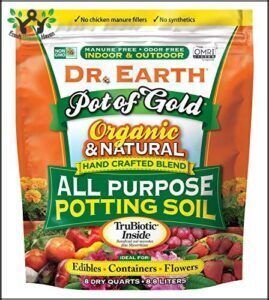
Ever wondered what makes some potted gardens burst with flavor while others barely limp along? Dr Earth Organic Potting Soil Mix is your ticket to lush herbs every time. Packed with organic matter, its light soil structure is just right for delicate roots. This organic potting soil nails the essentials—fertilizer needs, moisture levels, and drainage—without harmful extras.
Here’s why gardeners love it:
- OMRI-certified for peace of mind
- Promotes strong root development
- Ideal moisture retention
- Rich in natural nutrients
- Perlite boosts drainage
2. Organic Coco Coir Grow Medium
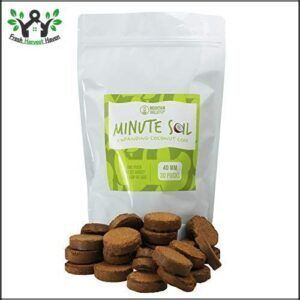
There’s something downright satisfying about watching a brick of coco coir expand and come alive with the promise of thriving herbs. As an organic potting soil alternative, coco coir brings both practical and eco-friendly value to the table.
Its fine, airy soil structure keeps roots breathing and moisture right where herbs need it—not bogged down, not dried out. Coconut coir holds up to 10 times its own weight in water, so even basil’s thirst is easily quenched.
A potting mix built from coco peat, compost, and perlite—your classic grow medium mix—delivers a healthy dose of organic matter while dialing in structure. Coco coir benefits also include pH neutrality, meaning you won’t have to fuss over acidic surprises.
3. Organic Potting Soil Mix Blend
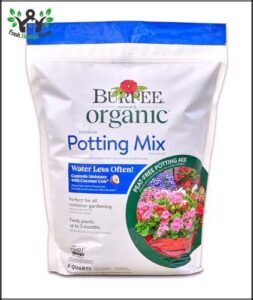
When you reach for an organic potting soil mix blend, you’re giving your herbs a head start that makes all the difference. This kind of soil mix isn’t just dirt—it’s an artful balance of soil composition, organic matter, and good aeration, all working together in your favor.
Real organic potting soil blends take the legwork out of creating the perfect environment for roots to thrive. You’ll notice how the blend’s moisture levels stay steady, even on hot days, and its structure lets air slip through easily to prevent soggy roots.
Look for these standout features:
- Coconut coir for reliable moisture retention
- OMRI-listed compost boosting organic matter
- Perlite woven in for ideal drainage and aeration importance
- Nutrient balance tuned for herbs, not just veggies
- Adaptability for both containers and raised beds
That’s a recipe for lush, happy herbs every time.
4. Organic Potting Soil for Gardens
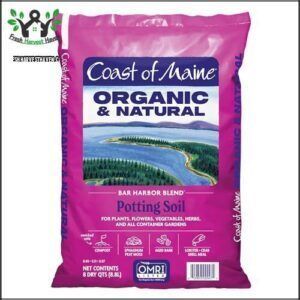
One quick scoop of organic potting soil can turn your potted herb garden into a thriving patch bursting with flavor. The beauty of a premium organic soil mix—like Coast of Maine’s blend—is all in the Soil Composition: peat moss for water control, compost for Garden Fertility, and perlite to keep roots breathing easy.
Throw seafood meal into the equation, and you’re giving your herbs a hearty protein fix. You might spot an occasional pot worm or fungus gnat, thanks to the rich Organic Matter and natural Compost Benefits. That’s a small trade-off for soil that’s OMRI-listed and packed with nutrients.
If you’re chasing value without compromising quality, this organic potting soil brings big results across a variety of Potting Mixes for herbs.
5. Organic Premium Potting Soil Blend
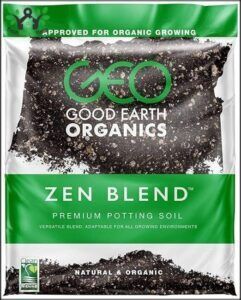
Ready for a soil that turns everyday herbs into backyard legends? Premium organic potting mix delivers exactly that transformation. This powerhouse blend combines over 20 natural ingredients—crustacean meal, seabird guano, and worm castings—creating the perfect nutrient balance your herb garden craves.
The lightweight soil structure promotes superb aeration while maintaining ideal moisture levels. You’ll notice healthier root development and explosive leaf growth that’ll make your neighbors wonder what magic you’re working. The rich organic matter feeds beneficial microbes, creating a living ecosystem in every pot.
This organic potting mix maintains superb soil pH naturally through its balanced compost blend. While it costs more than basic potting soil, the results speak volumes. Your basil will burst with flavor, oregano will thrive like never before, and every herb will reach twice its normal size. That’s the power of premium ingredients working together.
6. Indoor Herb Garden Soil Mix 4qt
View On Amazon
Cramped kitchen windowsills don’t have to mean compromising on herb garden dreams—this compact 4-quart mix proves that big flavors come in perfectly sized packages. This indoor soil blend combines peat moss, perlite, and worm castings in perfect proportions for container gardening success. The lightweight formula ensures excellent soil aeration while the balanced nutrients support vigorous herb nutrition from day one.
You’ll love how this potting soil mix eliminates guesswork for your indoor herb garden. The resealable packaging keeps your soil fresh between plantings, making it ideal for successive herb sowings. While you’ll need supplemental feeding after six weeks, the initial growth burst is noteworthy.
- Space-efficient design lets you grow restaurant-quality herbs in tiny apartments
- Quick germination means fresh basil on your pasta within weeks
- Foolproof ratios eliminate mixing mistakes that kill delicate seedlings
7. Organic Black Potting Soil Mix
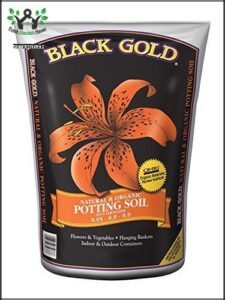
Think of organic black potting soil mix as the espresso of herb gardening—dark, concentrated, and delivering an intense flavor boost that transforms ordinary herbs into culinary powerhouses. This rich soil composition creates the perfect foundation for your container gardening adventures.
The black soil benefits go beyond aesthetics. That dark color signals high organic matter content, which means your herbs get steady nutrition without synthetic additives. The soil aeration stays excellent thanks to naturally occurring particles that prevent compaction.
Here’s what makes this organic potting mix your secret weapon:
- Moisture mastery – Retains water 40% longer than standard potting soil
- pH excellence – Naturally maintains ideal soil pH between 6.0-7.0
- Flavor amplification – High organic matter intensifies herb essential oils
Your potting mix ratio should include 20% perlite if you’re growing Mediterranean herbs like rosemary or thyme. This herb garden soil works brilliantly for basil, parsley, and cilantro straight from the bag.
8. Organic Worm Castings Garden Fertilizer
Picture tiny earthworms working around the clock in your compost bin, transforming kitchen scraps into the richest, most nutrient-dense fertilizer your herbs will ever taste. That’s exactly what worm castings deliver—pure Natural Nutrients without any synthetic additives.
These Worm Castings Benefits go way beyond typical Organic Fertilizer. Your herbs get slow-release nutrition that won’t burn delicate roots, plus improved soil pH balance between 6.0-7.0. The nutrient density is remarkable—packed with nitrogen, phosphorus, and potassium in perfect ratios.
Soil Enrichment happens instantly when you mix castings into your organic potting mix. Try this: blend one part worm castings with three parts potting soil for explosive growth. You can also brew Compost Tea by steeping castings in water for 24 hours, creating liquid gold for weekly feeding.
Your basil will bush out like crazy, and rosemary develops that intense flavor you’ve been chasing. This fertilizer transforms ordinary herbs into culinary superstars.
9. Seed Starting Potting Mix Formula
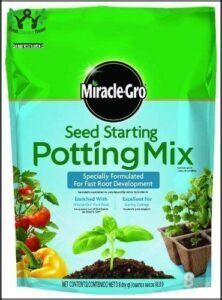
While worm castings give your established herbs amazing nutrition, growing from seed requires an entirely different approach that puts germination success first. Your Seed Selection deserves a specialized formula that creates perfect conditions for those first vital weeks.
Seed germination thrives when Soil Temperature stays consistently warm and Mix Ratios balance moisture retention with drainage. You’ll want a lighter texture than standard potting soil—think fluffy cake batter rather than dense clay. The ideal soil pH levels hover around 6.5, creating favorable conditions for Germination Rates that’ll make you proud.
Here’s what transforms ordinary seeds into thriving seedlings:
- Nutrient-rich soil provides gentle feeding without overwhelming tender roots
- Soil texture balance prevents damping-off disease through proper aeration
- DIY potting soil mixing lets you control every ingredient for maximum success
- Seedling Care becomes easy when your foundation starts right
This specialized approach turns your herb garden dreams into reality, one perfectly germinated seed at a time.
10. Ocean Forest Potting Soil Mix
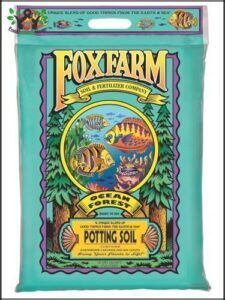
After mastering seed starting techniques, you’ll want a premium soil that can manage your herbs from seedling to harvest—and FoxFarm’s Ocean Forest delivers exactly that powerhouse performance.
This organic potting mix creates outstanding Soil Structure through aged forest products, earthworm castings, and bat guano. Your herb garden gets the perfect Nutrient Balance without overwhelming tender roots—think gentle feeding rather than force-feeding.
The Root Development you’ll see is impressive. Ocean Forest’s composted bark and coir fiber maintain ideal Moisture Levels while preventing waterlogged conditions that kill herbs. Your basil won’t need constant babying.
What really sets this soil mix apart? It dramatically reduces Fertilizer Needs for the first month. The slow-release nutrition means your container gardening success comes naturally. You’re investing in soil that works as hard as you do.
Potting Soil Basics
You can’t just grab any bag of soil and expect your herbs to thrive. The difference between garden soil and potting mix isn’t just marketing—it’s the foundation of your herb garden’s success.
Let’s break down what makes potting soil work and how to spot the duds that’ll leave your basil looking sad.
Garden Soil Vs Potting Soils
Garden soil and potting soil aren’t interchangeable – they’re built for different jobs. Garden soil packs down hard in containers, becoming up to 3 times denser than potting mixes. This compaction chokes roots and cuts plant growth by roughly 40%. Potting soil stays light and airy, with around 70% pore space after watering compared to just 25% in clay-heavy garden soil.
Drainage systems matter enormously – over 90% of container gardening failures trace back to using garden soil. Soil sterilization in commercial potting mixes slashes disease risk by 80% and keeps weed seeds under 2%, while garden soil can harbor 200 seeds per kilogram.
Your root health depends on choosing the right soil mix – potting blends maintain ideal soil pH and texture without amendments. Understanding the differences between garden and potting soil types is essential for successful container gardening.
Key Factors to Perfect Potting Mix
Three essential elements – drainage, nutrients, and texture – separate mediocre potting mixes from ones that actually work. Your potting soil needs moisture levels that don’t drown roots while keeping nutrient balance steady. Aeration importance can’t be overstated – perlite creates air pockets that fuel root development.
Here’s what your soil mix must deliver:
- Drainage through 40-50% perlite or vermiculite
- Compost at 25-35% for sustained nutrients
- Soil structure that stays loose for oxygen flow
Avoiding Poor Quality Soils
Cheap potting soil might save you a few dollars upfront, but it’ll cost you every thriving herb you hoped to harvest. Watch for soil contamination—mystery ingredients and chemicals that destroy root systems before you’ve planted your first basil.
Poor drainage turns containers into swamps, triggering root damage and rot. Low nutrient density means stunted growth and pale leaves signaling nutrient deficiency. Check soil pH and water retention—quality mixes crumble easily without clumping.
Skip brands with weird odors, visible pests, or dust clouds. Your herbs can’t recover from soil erosion or compacted texture that suffocates roots.
Soil PH and Nutrients
Getting your soil’s pH and nutrients right isn’t rocket science, but it makes all the difference between herbs that thrive and ones that barely survive. Most herbs want a slightly acidic to neutral range—think 6.0 to 7.0—and they need balanced nutrition to develop strong roots and flavorful leaves.
Let’s break down what you need to know about pH levels, essential nutrients, and drainage to keep your potted herbs growing strong.
Understanding Soil PH
Think of soil pH as the master key that unlocks nutrients your herbs desperately need—without it in the right range, you’re basically growing plants in a locked vault. Most herbs thrive when soil pH levels hover between 6.0 and 7.0. This ideal spot creates the perfect pH balance for nutrient absorption.
You can test soil acidity in minutes with an affordable pH testing kit. Simply insert the probe into moist soil and read the results. If your pH balance requirements aren’t met, your herbs will show yellowing leaves and stunted growth—clear signs nutrients are locked away.
Different herbs demand different alkaline limits:
- Mediterranean varieties like rosemary prefer slightly alkaline soils (7.0-7.5)
- Basil and cilantro love mildly acidic soils (6.0-6.5)
- Parsley tolerates neutral conditions (6.5-7.0)
- Mint adapts well across the entire 6.0-7.0 range
Adjust acidic soils with lime; lower alkaline levels with sulfur. Test twice yearly to maintain ideal nutrient balance.
Nutrient Requirements for Herbs
Your herbs demand three primary macronutrients—nitrogen, phosphorus, and potassium—for peak performance. Nitrogen between 100–200 ppm drives leafy growth without triggering excessive foliage. Phosphorus powers root development and energy transfer, while potassium strengthens disease resistance and amplifies flavor.
Micronutrient roles matter too: iron prevents chlorosis, and boron aids healthy new leaves. Watch for nutrient deficiency signs like yellowing lower leaves or purplish margins.
Apply water-soluble fertilizers at 100 ppm nitrogen or choose controlled-release options for steady feeding. Soil amendments and nutrient-rich soil boost nutrient availability when soil pH levels stay ideal.
Water and Drainage Considerations
Your soil can have perfect nutrients, but waterlogged roots will kill your herbs faster than any deficiency. Herbs need well-draining soil that releases excess water while maintaining moisture levels—think damp sponge, not swamp.
Drainage systems start with containers featuring multiple holes and soil mixes rich in perlite or pumice. These create aeration pockets that prevent water logging and support root health. Mediterranean varieties like rosemary demand superior soil drainage, while basil tolerates slightly higher water retention.
Test your mix: squeeze a handful—it should crumble apart, not form a muddy clump. That’s your signal for healthy moisture levels and thriving herbs.
Container Selection
Your pot choice matters just as much as your soil. The right container keeps roots happy, prevents drainage disasters, and makes your herb garden easier to manage.
Let’s look at what works best for size, material, and timing your fertilizer schedule.
Size and Material
Pick the wrong pot, and even the best soil won’t save your herbs from struggling. Container depth and pot size matter tremendously—basil demands 12-inch containers for sturdy roots, while thyme thrives in compact 6-inch pots.
Material types shape your watering routine: terracotta breathes beautifully but dries fast, whereas plastic holds moisture longer. Always verify drainage holes exist—they’re non-negotiable for preventing waterlogged soil mix disasters.
Match soil volume to your container gardening goals, and consider how perlite-enriched potting soil performs in different materials for ideal drainage.
Mobility and Aesthetics
Once you’ve nailed the perfect pot size and material, portability becomes your next strategic move—especially when chasing sunlight or revitalizing your space for guests. Lightweight portable planters give you the freedom to shift your indoor herb garden as seasons change or when you’re experimenting with different drainage patterns in your container gardening setup.
Your pot designs should work double-duty—functional yet visually striking. Think of containers as garden decor that reflects your style while housing quality potting soil and herbs.
- Lightweight Materials – Resin or fiberglass planters move easily without sacrificing your soil mix stability
- Color Schemes – Coordinate earth tones for calm kitchens or vibrant hues for lively patios
- Space Optimization – Vertical stacking and tiered stands expand growing area in tight quarters
- Rolling Bases – Casters transform heavy containers into mobile growing stations you’ll actually rearrange
When to Fertilize Herbs
Timing matters more than you’d think—feed your herbs too early, and you’re wasting nutrients; too late, and they’ll struggle to recover. Container plants burn through fertilizer content faster than garden beds because watering flushes nutrients straight out the drainage holes.
Soil testing reveals exactly when your herbs need a boost, but most potted varieties follow predictable fertilization timing:
- Transplant phase – Apply organic supplements when seedlings move into permanent pots with fresh potting mix
- Active growth – Feed every 4-6 weeks spring through fall for peak nutrient uptake
- Post-harvest recovery – Half-strength fertilizer after heavy pruning restores plant nutrition quickly
Skip fertilizing during winter dormancy unless you’re growing indoors year-round.
Watering And
Watering well separates thriving herbs from struggling ones—get it right and your plants reward you with explosive growth. Your goal? Perfect water balance where soil moisture stays consistent without drowning roots. Check moisture by poking your finger one inch deep—if it’s dry, it’s watering time.
Well-draining soil with strong moisture retention creates the ideal balance. Mediterranean herbs like rosemary need watering every 3-4 days, while basil craves moisture every 2-3 days. Yellow leaves signal overwatering; wilting means you’re underwatering.
Here’s your irrigation tip: use rainwater when possible—it beats tap water because it lacks chlorine and maintains better soil pH. Drainage systems matter too. Pots without holes? That’s a death sentence for herbs.
Frequently Asked Questions (FAQs)
What is a good potting soil for herbs?
For a thriving herb garden, the magic starts with potting soil that drains well and holds just enough moisture.
Blend equal parts potting soil, perlite, and compost for the ideal soil composition and balanced herb nutrition.
What is the best potting mix for plants?
A winning potting mix comes down to Soil Composition—blending quality potting soil, perlite, and compost.
This balance of Potting Materials delivers plant nutrition, ideal drainage, and moisture control, creating healthy garden ecology with adaptable fertilizer options along the way.
How do I choose the right potting mix for my herb garden?
Look for well-draining potting soil with a balanced soil composition—equal parts quality soil, perlite, and compost.
For root health, aim for a soil pH between 0–0. Avoid heavy garden soil; herb varieties need proper drainage wherever your garden climate.
What is the best potting soil for Mediterranean herbs?
If you want foliage as lush as a Mediterranean hillside after rain, go for a gritty, well-draining potting soil with added sand or perlite—perfect Soil Composition and Aeration for Mediterranean herbs that hate soggy feet and thrive on lean nutrition.
What type of potting soil should I use?
Choose a light, well-draining potting soil with plenty of organic matter. A blend featuring perlite or vermiculite boosts garden drainage and keeps herbs happy. Skip dense earth; your herb garden thrives on airy soil composition and lively potting mixes.
Do you need potting soil for herbs & vegetables?
You need potting soil for herbs and vegetables—there’s just no getting around it. Ordinary dirt won’t cut it.
Good soil quality fosters Nutrition and Vegetable Care, boosts drainage, and makes Garden Planning much smoother—absolutely essential for containers.
What is the best soil mixture for potted herbs?
Picture a basil plant thriving in a sunny window—its roots cushioned by a blend of potting soil, perlite, and compost.
This soil composition strikes the right balance: excellent drainage, steady garden aeration, and essential herb nutrition for strong root development.
What is the best soil mix for basil in pots?
For vibrant basil, blend equal parts potting soil, perlite, and compost. This mix delivers moisture retention and excellent aeration—two essentials for basil soil requirements—while supporting your herb garden’s drainage system and mild, gentle herb fertilization.
Which herbs should not be planted together?
Companion Planting matters: Mint will overrun other herbs, so plant it solo. Fennel disrupts soil sharing and stunts neighbors—give it its own pot. And avoid pairing quick-spreading oregano beside basil in your herb garden layout.
Can I use all-purpose potting mix for herbs?
Just as every artist needs the right canvas, your herb garden appreciates a quality all-purpose potting mix.
As long as it drains well and meets your herbs’ fertilizer needs, soil compatibility and garden performance won’t hold you back.
Conclusion
As the saying goes, “You reap what you sow,” and choosing the best soil mix for potted herb gardens is where that harvest begins. Every herb has its quirks, but a well-chosen soil is the invisible partner in their success.
Trust your eyes, test the texture, and stay curious—nature rewards those who experiment. The right mix turns a pot into a canvas.
Nurture your roots well, and everything else you savor from your garden will follow.
- https://sassyherbgarden.com/best-potting-soil-for-herbs/
- https://stonepostgardens.com/potting-soil-for-herbs-and-vegetables/
- https://www.backyardstyle.com/best-soil-for-herbs/
- https://theyardandgarden.com/best-fertilizers-for-herbs/
- https://www.geturbanleaf.com/blogs/soil/potting-mix-for-herbs-and-vegetables

